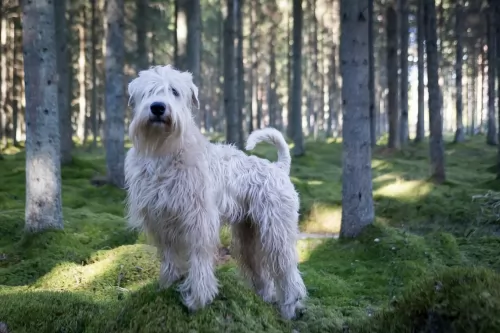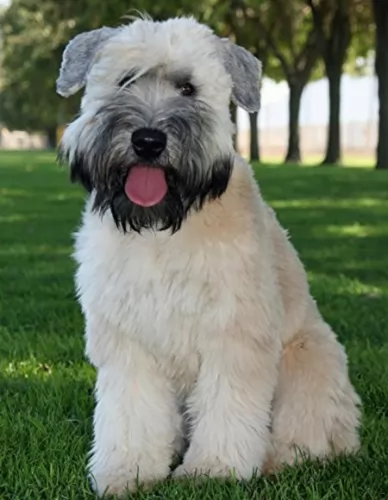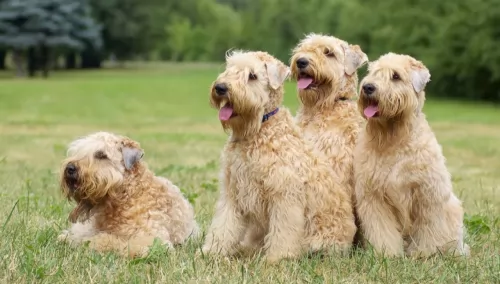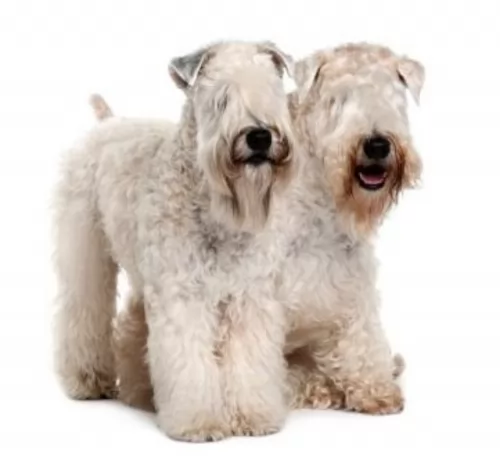 Petzlover
Petzlover Leonberger is originated from Germany but Soft-Coated Wheaten Terrier is originated from United Kingdom. Leonberger may grow 30 cm / 12 inches higher than Soft-Coated Wheaten Terrier. Leonberger may weigh 57 kg / 126 pounds more than Soft-Coated Wheaten Terrier. Leonberger may live 5 years less than Soft-Coated Wheaten Terrier. Leonberger may have more litter size than Soft-Coated Wheaten Terrier. Both Leonberger and Soft-Coated Wheaten Terrier requires Moderate Maintenance.
Leonberger is originated from Germany but Soft-Coated Wheaten Terrier is originated from United Kingdom. Leonberger may grow 30 cm / 12 inches higher than Soft-Coated Wheaten Terrier. Leonberger may weigh 57 kg / 126 pounds more than Soft-Coated Wheaten Terrier. Leonberger may live 5 years less than Soft-Coated Wheaten Terrier. Leonberger may have more litter size than Soft-Coated Wheaten Terrier. Both Leonberger and Soft-Coated Wheaten Terrier requires Moderate Maintenance.
 Hailing from Germany, and more specifically the city of Leonberg, the Leonberger is a giant dog breed.
Hailing from Germany, and more specifically the city of Leonberg, the Leonberger is a giant dog breed.
A resident of Leonberg, Germany, was looking to develop a dog that resembled a lion and in 1846 it was announced that such a dog had been developed by crossing a Newfoundland, Saint Bernard and Pyrenean Mountain dog.
It was after 2010, when the Leonberger Club of America joined the American Kennel Club, that the strict breeding rules were no longer mandatory for all Leonbergers.
 This wheaten colored terrier hails from Ireland. Although the Wheaten has been around for a long time, it was in 1937 that he was recognized as a breed in Ireland.
This wheaten colored terrier hails from Ireland. Although the Wheaten has been around for a long time, it was in 1937 that he was recognized as a breed in Ireland.
The British Kennel Club also recognized the Wheaten and the dog was also exported to the United States. Serious interest started being shown for the Terrier in the 1970s. It was in 1973 that they were recognised by the American Kennel Club.
 As a giant breed, the Leonberger stands at between 65cm and 80cm in height. He weighs a hefty 40 – 77kg both males and females.
As a giant breed, the Leonberger stands at between 65cm and 80cm in height. He weighs a hefty 40 – 77kg both males and females.
These dogs are described as being dimorphic. It means that there is quite a difference in the looks of the males and females, with the male dogs being heftier and larger than the females.
The head of the dog is large, he has almond-shaped, dark brown eyes and the ears are medium sized and floppy. The tail is long and he has webbed feet which makes him a good swimmer too.
The thick, double coat can be straight or wavy and comes in different colors such as reddish-brown, tan, sandy or yellowish and the hairs can be tipped with black. He sheds quite a bit so will need regular brushing.
The Leonberger can have between 6 – 14 puppies and these puppies are like big, fat, cuddly, fluffy teddy bears. Don’t be tempted to just buy one because of his wonderful looks because they turn out to be huge dogs that eat a lot and the coat can take quite a bit of effort to keep groomed.
Fondly referred to as the Leo, this giant beautiful dog is social and in spite of his size, he should never be left alone in the backyard for long periods of time. He needs to come indoors from time to time to enjoy some interaction with his human family.
He is a family dog, and with training and socialization, he becomes a well-rounded, confident, obedient pet, quiet and content and sensitive to his owner’s moods.
Even though he becomes a great family pet, you need to think twice before you decide to own one of these large dogs as he can be costly to feed.
 The Wheaten is a medium sized dog standing at between 43 and 50cm and weighing between 13 and 20kg both male and female. The coat of the dog is soft, silky and wavy to even curly and is a wheaten to ginger color.
The Wheaten is a medium sized dog standing at between 43 and 50cm and weighing between 13 and 20kg both male and female. The coat of the dog is soft, silky and wavy to even curly and is a wheaten to ginger color.
The coat of the puppy is dark but as he grows up it changes into the wheaten color although the ears may be a dark brown color. Pet owners like that the Wheaten is a very low shedding dog.
Playful, social and friendly, the Wheaten has always been put to good use on the farm. These days he is pet and companion. He is energetic and playful so children love having him around.
He is slightly more hyper and energetic than other Terrier breeds so will require a good dose of exercise.
He is smart and strong willed, and training and socialization turns him into an amicable pet to have around, so much so that he is sought after as a therapy-dog.
They’re easy-going dogs with no aggression issues but they still make great watch dogs and want to do whatever it takes to look after- and protect their human family.
 Don’t be deceived by the looks of the big Leonberger because he isn’t aggressive, but quiet and calm. Large he may be, but he isn’t sluggish either and he will certainly require exercise such as a long, fairly lively walk every day.
Don’t be deceived by the looks of the big Leonberger because he isn’t aggressive, but quiet and calm. Large he may be, but he isn’t sluggish either and he will certainly require exercise such as a long, fairly lively walk every day.
They’re intelligent dogs too and respond well to socialization and training. He is a social dog and wants to enjoy plenty of interaction with his human family members.
These dogs are often used as rescue- and therapy dogs as they are so loving and sensitive. Give him lots of love and good care and you’re going to have the most wonderful pet that lives up to the saying – dogs are man’s best friend.
 The Soft Coated Wheaten Terrier has always made an excellent farm dog, but today he is more suited as pet and companion.
The Soft Coated Wheaten Terrier has always made an excellent farm dog, but today he is more suited as pet and companion.
He adapts easily to life in the city or the countryside. Wherever he is, he will need his exercise. He also longs to be an active part of his human family, and then he’s happy, lively, social and friendly and is a great playmate for children.
 Leonbergers are strong, generally healthy dogs. It is said that very large dogs like this don’t live as long as smaller dogs and they also face more health issues. Orthopedic issues such as hip dysplasia are more common with large breeds.
Leonbergers are strong, generally healthy dogs. It is said that very large dogs like this don’t live as long as smaller dogs and they also face more health issues. Orthopedic issues such as hip dysplasia are more common with large breeds.
An orthopedic problem like this is a misalignment of a joint. This large dog also tends to develop elbow dysplasia too. Fortunately today, hip- and elbow dysplasia is controlled because of efforts of breeders to have their Leonbergers screened.
Nonetheless it is important to know about this ailment. The word ‘Dysplasia’ is referring to an abnormality of development. With both hip- and elbow dysplasia, there is abnormal development of the joints, and osteoarthritis can build up, causing lameness for your giant canine.
Cancer is sadly a leading cause of death in dogs over the age of 10 years. Lymphoma is a blood-related cancer – a tumor of the lymph nodes. Dogs can develop different forms of lymphoma. The warning signs are a lump or a wound that won’t heal, swelling in the bone and abnormal bleeding.
Luckily cancer is very treatable in dogs, but you need to get your dog to the vet as soon as possible.
 When you bring a Wheaten Terrier into your home, you’re not likely to have too many vet fees as he tends to be a healthy dog breed, being able to reach 13, 14 or 15 years of age with good care.
When you bring a Wheaten Terrier into your home, you’re not likely to have too many vet fees as he tends to be a healthy dog breed, being able to reach 13, 14 or 15 years of age with good care.
Look out for a dog ailment known as Protein-losing enteropathy (PLE). This is a condition where the dog isn’t able to properly absorb protein in the digestive tract, so that it is passed in their stools.
It can be fatal, but if caught early, some dietary changes can keep it under control.
Also, look out for inflammatory bowel disease. This disease occurs when the stomach of the dog has a large number of inflammatory cells which can change the lining of the digestive tract, preventing the normal absorption of food.
 That long coat of the Leonberger is going to require some brushing at least twice a week. He is also a moderate shedder and you want to get rid of all that loose hair and to keep him looking well groomed.
That long coat of the Leonberger is going to require some brushing at least twice a week. He is also a moderate shedder and you want to get rid of all that loose hair and to keep him looking well groomed.
A proper, nutritious diet is an essential part of having healthy, happy dogs and if you’re unsure about how to feed your giant pet, speak to your veterinarian.
The best diet for dogs is always very debatable, but essentially it needs to be kept simple. Try and invest in the very best commercially manufactured dog food for large breeds. Every dog wants a tasty home-made morsel from time to time. Add in cooked chicken, brown rice as well as cooked or raw vegetables. Raw meat can also be added in from time to time.
You want to avoid feeding the Leonberger puppy a high protein diet as this encourages rapid growth and you want to avoid that.
 Brush your pet’s silky coat twice a week. Such a silky coat can get all tangled and matted. If you prefer, many people opt to rather have the Wheaten’s coat professionally clipped as then it is easier to handle. They like to have the hair clipped that hangs over the dog’s eyes.
Brush your pet’s silky coat twice a week. Such a silky coat can get all tangled and matted. If you prefer, many people opt to rather have the Wheaten’s coat professionally clipped as then it is easier to handle. They like to have the hair clipped that hangs over the dog’s eyes.
Other grooming tasks require you to check inside his ears for redness which could indicate an infection. Trim his nails and check him over for ticks and fleas.
Have your Wheatie trained and socialized as he is a stubborn dog breed and you want him to be well mannered and obedient.
Terriers like this are energetic dogs and he is going to need exercise every day. A walk for a dog is always a welcome experience as it gives him the opportunity to sniff around and pick up new smells. Play ball- or frisbee games with him as this can tire him out a bit.
If your dog shows signs of illness, get him to the vet. He is such a feisty dog that it can be unbearable to see him out of sorts.
Terriers are energetic dogs so if you feed your dog one of the commercial dog foods, make sure the label indicates what food it is. This is because the foods are manufactured according to the type of dog it is, its age, size and energy levels.
Always try and go for the high quality foods which don’t have all those unhealthy ingredients in them. Try to include some home-made food – nothing exotic and spicy – just plain, wholesome food that won’t upset his stomach.
Boiled chicken, brown rice or pasta and spinach, sweet potatoes and carrots is super tasty and nutritious. You can chop it up and add it to your pet’s kibble twice a week.
Try and include a little bit of raw meat to his diet occasionally as this can go towards ensuring he doesn’t get skin diseases. Always ensure he has a constant supply of fresh, cool water available.